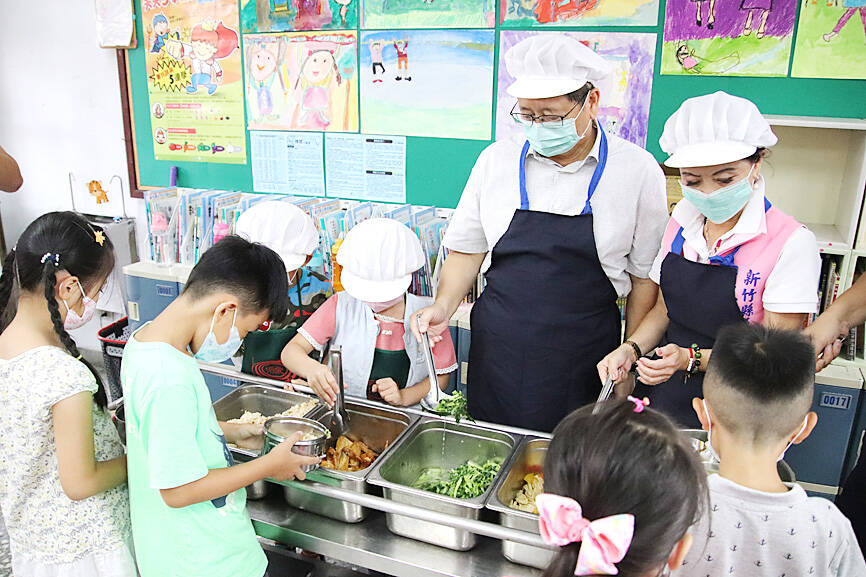The Executive Yuan yesterday approved a draft act to promote nutrition, which would punish false advertisements about food products, with a repeatable fine of up to NT$300,000 (US$9,300).
Cabinet spokesman Lin Tze-luen (林子倫) made the announcement at a news conference following the weekly Executive Yuan meeting.
He cited Premier Chen Chien-jen (陳建仁) as saying during the meeting that the draft act is part of an effort to tackle unhealthy diets, which have significantly impacted public health and contributes to the spread of noncommunicable diseases.

Photo: Huang Mei-chu, Taipei Times
The draft act would facilitate the creation of a supportive environment for healthy eating and public education on nutrition, as well as improve public health, he paraphrased Chen as saying.
The premier expressed hope that legislators would pass the proposal quickly, Chen added.
According to the draft, making false claims about health in food advertising or spreading them by any other methods would be an offense punishable by a fine of between NT$30,000 and NT$300,000 following a warning.
The fine could be imposed consecutively, it added.
The draft act would also authorize the establishment of a food nutritional value database, new diet guidelines for the consideration of public social welfare programs and incentives for utilizing healthy additives.
The central government should propose measures to improve the environment for good nutrition in universities, schools, kindergartens, hospitals, nursing homes and correctional facilities, it said.
This means that the performance review metrics of the relevant government facilities and agencies would include nutrition and diet education programs, while the training of relevant personnel would include these subjects, according to the draft act.
Public institutions that care for children and young people would be required to serve healthy meals, while kindergartens, elementary schools, and junior and senior-high schools would be required to serve or sell healthy snacks and meals, it said.
Healthy meals must be served to children and young people under the care of a public institution, while healthy snacks and beverages should be served in kindergartens, elementary schools, high schools and their commissaries, the draft act says.
The proposed nutrition and diet law was drafted to fulfill Taiwan’s pledge to comply with the Rome Declaration on Nutrition and the Framework for Action made by the UN in 2016, the Ministry of Health and Welfare said in a news release.
The draft act’s language drew from similar legislation for eliminating malnutrition in Japan, South Korea and the US, among other nations, it said.

US President Donald Trump said "it’s up to" Chinese President Xi Jinping (習近平) what China does on Taiwan, but that he would be "very unhappy" with a change in the "status quo," the New York Times said in an interview published yesterday. Xi "considers it to be a part of China, and that’s up to him what he’s going to be doing," Trump told the newspaper on Wednesday. "But I’ve expressed to him that I would be very unhappy if he did that, and I don’t think he’ll do that," he added. "I hope he doesn’t do that." Trump made the comments in

NOT AN OPENING: Trump’s violation of international law does not affect China’s consideration in attacking Taiwan; Beijing lacks capability, not precedent, an official said Taiwanese officials see the US’ capture of the president of Venezuela as a powerful deterrent to Beijing’s aggression and a timely reminder of the US’ ability to defeat militaries equipped with Chinese-made weapons. The strikes that toppled Venezuelan President Nicolas Maduro signaled to authoritarian leaders, including Chinese President Xi Jinping (習近平), US President Donald Trump’s willingness to use military might for international affairs core to US interests, one senior official in Taipei’s security circle said. That reassured Taiwan, the person said. Taipei has also dismissed the idea that Trump’s apparent violation of international law could embolden Beijing, said the official, who was not

A cold surge advisory was today issued for 18 cities and counties across Taiwan, with temperatures of below 10°C forecast during the day and into tonight, the Central Weather Administration (CWA) said. New Taipei City, Taipei, Taoyuan and Hsinchu, Miaoli and Yilan counties are expected to experience sustained temperatures of 10°C or lower, the CWA said. Temperatures are likely to temporarily drop below 10°C in most other areas, except Taitung, Pingtung, Penghu and Lienchiang (Matsu) counties, CWA data showed. The cold weather is being caused by a strong continental cold air mass, combined with radiative cooling, a process in which heat escapes from

Snow this morning fell on Alishan for the first time in seven years, as a strong continental cold air mass sent temperatures plunging across Taiwan, the Central Weather Administration (CWA) said. The Alishan weather station, located at an elevation of about 2,200m in central Taiwan, recorded snowfall from 8:55am to 9:15am, when the temperature dropped to about 1°C, the CWA said. With increased moisture and low temperatures in the high-altitude Alishan area, the conditions were favorable for snow, CWA forecaster Tsai Yi-chi (蔡伊其) said. The last time snow fell at the Alishan weather station was on Jan. 10, 2018, while graupel fell there